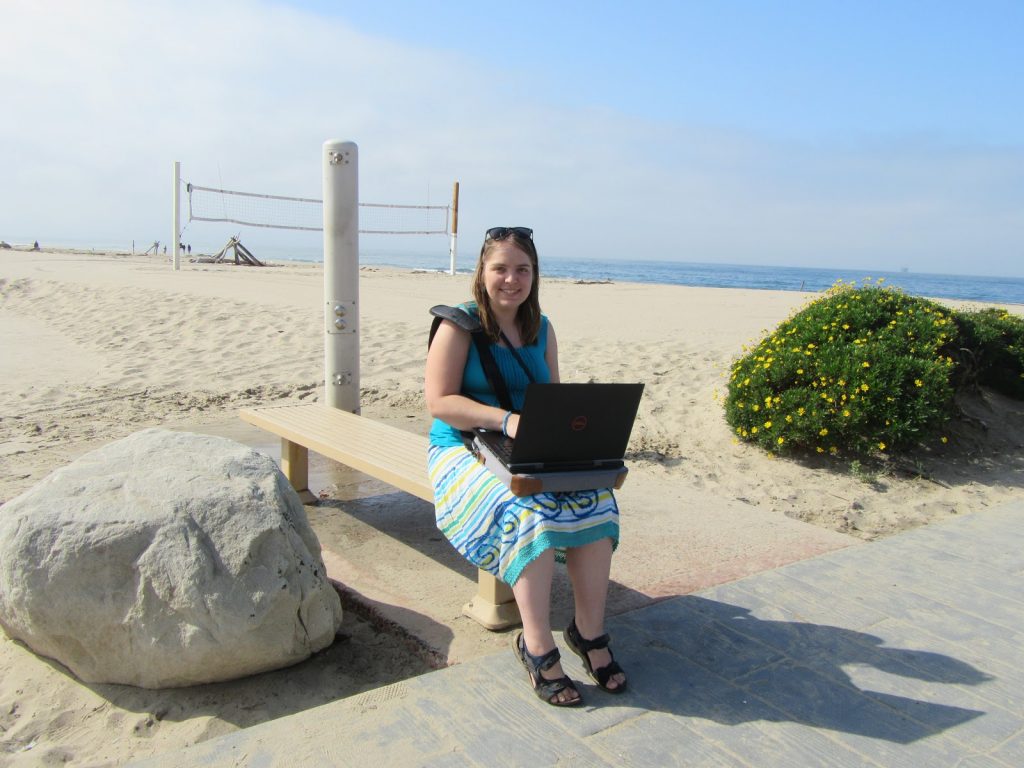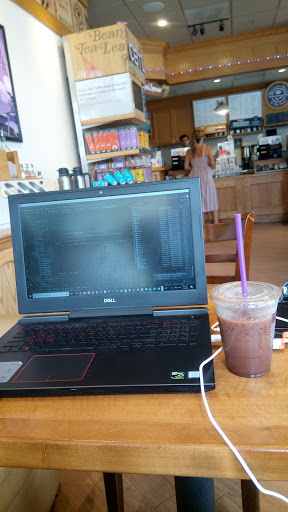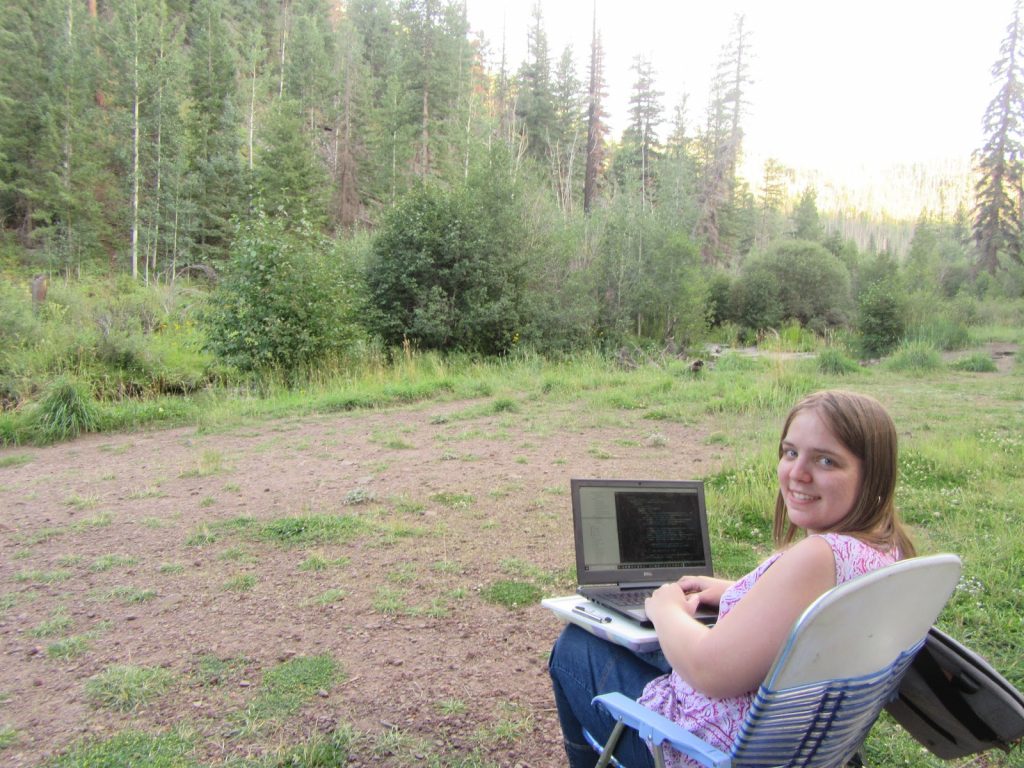1. Hey, can you please introduce yourself?
Hi, my name is Sylvia Barnai, and I am from Phoenix, Arizona, with a Masters degree in Software Engineering from Arizona State University. I am a software engineer, working as a full-time remote employee for IFS North America. I am developing mobile apps for Android and iOS devices for field service management, working on both the frontend and backend.
I work alongside other developers to fix bugs and develop new features for these apps for a variety of customers in various industries, such as coffee shops, repairs, and construction. These apps help customers schedule their tasks for technicians.
I also work on creating configurations for these apps by changing the app’s designs, managing the fields in the database, and writing client scripts. I have been working for IFS since February and am really enjoying it thus far. I have worked remotely at my previous jobs from time to time, but is my first fully remote position.
2. What motivated you to choose remote working?
I enjoy the flexibility that comes with working remotely. I like being able to choose the environment that I work in and schedule my hours depending on how I structure my day. Some days I may want to work from home; other days I might feel like working in a library in the city.
This freedom allows me to be more productive and creative at work. I find that remote working roles help me have more control and autonomy in terms of how I want to plan my day out.
Engineering requires good problem-solving skills, and when you are stuck in a 9-to-5 bubble, sometimes it can be hard to find solutions to problems. In those situations, I like to take a break in the middle of the afternoon and come back to it. I also like having more time during the day (as a result of a more flexible schedule with no required commute) to pursue my own passions and spend more time with friends and family. It feels like I can truly make the most of each day.

3. What were your initial months like? Did it live up to your expectations?
The first couple months were pretty challenging. I had to read a lot of documentation and watch many tutorials in order to familiarize myself with the tools and platforms the company was using before being productive on my tasks related to mobile application development and scripting. I expected the first few months to be more difficult, but I thought I would have an easier time grasping the material and making more progress on projects.
It took me hours to be productive on some small, trivial tasks due to the learning curve that I was experiencing. I was working long hours during the day and night. It was very exhausting and time-consuming. I eventually started to get the hang of it, though.
Now my work is more collaborative, the workload is more manageable, and I can readily get the help and clarification I need in order to complete my tasks. Having supportive coworkers who are able to help me out or give me a sense of direction when I get stuck makes a huge difference.
4. How did you find remote working roles?
This is my first fully remote working role. At my previous job, I was working remotely once a week. Before that, I had another position in college when I was working for a startup that was partially remote (we met in-person a few times a week).
I was actively applying for remote opportunities on sites like Indeed, LinkedIn, and StackOverflow Jobs. I found my latest role on Indeed. When I was searching for remote roles, I narrowed down my search to what I was looking for in terms of skills, interests, and experience. I specifically looked for roles that were in mobile development (mostly Android and some iOS), or Java programming, that targeted candidates with at least 2 or 3 years of experience. I had to go through several rounds of interviews and take-home assignments with companies before finally landing the right role. When I found this software engineering role that was mostly focused on developing mobile applications in Android and iOS, I had a feeling that was the perfect fit for me. My enthusiasm, experience, and demonstration of my skills really took me far and helped me land the role I have now.
5. What have been the best, good and worst aspects of remote working for you?
The best aspect has by far been the flexibility. I like being able to schedule my 8 hour shift however I wish, depending on who I am collaborating with or how I am progressing with tasks. I have meetings with developers and managers from across the country and the world and I am able to adjust my schedule depending on what tasks need to be done.

A good aspect of remote working is being able to network and collaborate with coworkers from all across the country and the world and be able to learn more about their way of life and culture. In my case, we have a lot of developers in the Midwest, Canada, and Sri Lanka. I also like being able to reach out to colleagues in other timezones if I need assistance with something.
The worst aspect has been juggling working late hours with coworkers on the other side of the world and having meetings the next morning. It can be mentally draining, but I can always recover in the remainder of the week. It is ultimately up to you to manage your time and energy.
6. What tools do you swear by while working remotely?
I recommend a good microphone/speaker that allows you to attend meetings hands-free and makes it easy to communicate with the team or customers during conference calls. If you are working in a public place, then I stick to using a good pair of headphones or a headset for online meetings.
I use Skype for Business and Teams for collaborating and communicating with team members. I use OneDrive to store and share large files with colleagues. TeamViewer is an awesome tool to use for sharing your screen, especially when working with various operating systems (i.e., sharing your MacBook’s screen via video chat).
Also, make sure you have a quiet place to work. This is really essential, especially if you are working on problem-solving tasks that require a lot of thought and concentration.
Additionally, I recommend using a tool for taking notes and writing to do lists. I personally use Evernote for this. It is great for organizing and keeping track of my daily tasks, jotting down questions for meetings, and drafting ideas for projects.
7. Your most exciting/ hilarious experience since you started working remotely.
When I started working for IFS, I initially had a series of on-site training. My most exciting experience has been getting to know my coworkers at the training during lunch and meeting up with them for dinner. It was fun exploring new restaurants and getting to know the cities that I visited. We had all sorts of foods, from seafood to Korean BBQ to Hot Pot. We also made a conscious effort to try the local food. Wisconsin was known for its cheese, so we made sure to try their mac and cheese.

Just knowing that we won’t be seeing each other that often except maybe a few times a year made the times that we shared even more meaningful.
Working remotely also allowed me to explore cities I might not have otherwise visited. I had my on-site training in Wisconsin and Illinois. It was exciting to explore Milwaukee, walk on the beaches, and check out the museums and historic cheese shops. Chicago was nice to visit as well. I had been there previously before joining IFS, but it was fun to wander around in the big city and explore areas I hadn’t been to before, including some beaches and the Magnificent Mile.
8. What is your golden advice to a new remote worker?
Be open and responsive to change, but also try to find a good balance between work and downtime. It can be easy to get carried away by work when you are bombarded with emails from coworkers in various timezones. Make sure you have a dedicated block of time when you are definitely not working (in my case from 5pm to 8pm, as people in Central and Eastern time zones have left the office and developers in Sri Lanka have not woken up yet).
Try to figure out which hours you are the most productive and have the most energy. I personally am most productive in the afternoons and evenings. Generally, I try to schedule meetings for the mornings so that I can stay on track for the rest of the day. I try to tackle most of my projects in the late afternoon and sometimes evenings since that is when I am the most creative, productive, and focused.
9. How do you see your career shaping up and your goals?
I see myself becoming more of a mid-level and eventually senior level engineer. My passions and goals for software engineering were always pursuing desktop and mobile application development, so I am excited to do more of that presently and in the future. I really enjoy being able to build user interfaces and working with databases and on full-stack development in Android and iOS, as well as working on configurations using client scripting.
I also see myself eventually becoming a lead engineer for projects and mentoring junior engineers about FSM. I can picture myself traveling to customer sites and delivering presentations to customers about FSM and how to incorporate it into their mobile applications.
My goal is to continually learn and grow as a developer as I stay up to date with the latest trends and technologies, enhance existing skills and learn new skills, and network with other developers.
10. How do you expect remote working to evolve in the future?
I expect there to be better access to communication tools for remote employees. Microsoft Teams is considerably better than Skype for Business in terms of audio and video quality. The COVID-19 pandemic has definitely required many companies to operate remotely and I think many of them are starting to get a grasp on how to manage business remotely using the latest tools and technology.
I expect that there will be less essential travel and more remote sessions when conducting business with customers.
I also expect that people who are still working on-site or in the office will still be working from home multiple times a week, at least until there is a cure or vaccine for COVID-19. In general, I expect remote work to be more of an accepted way to work for a lot of companies, as they have seen the benefits of it, since most companies had to operate remotely due to the pandemic.
11. Where can we follow you on?
You can connect with me on LinkedIn.
Are you a remote worker too?
Would you like to share you story?
Just reach us at hrishikesh@remote.tools!